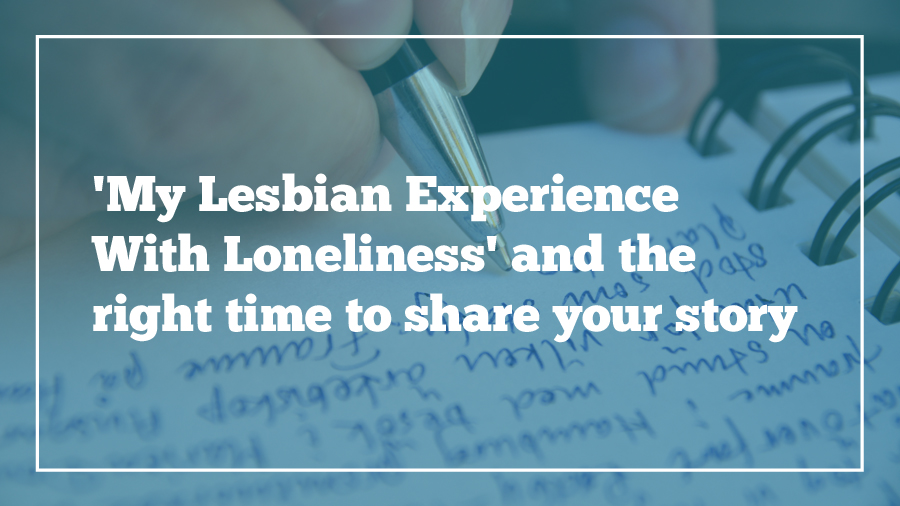
Like many manga fans, I pre-ordered My Lesbian Experience With Loneliness (affiliate link) and devoured it as soon as it arrived. The autobiographical story of a woman struggling with depression while coming to terms with her sexuality, it’s one many people will relate to. If the purpose of your writing is to make other people feel something, this is your literary role model.
Author Kabi Nagata does not sugarcoat her darkest moments. The sort of thing I’d be too embarrassed or ashamed to share, she exposes in fine detail: an eating disorder that had her binging between shifts as a supermarket cashier, a bald spot she has on the back of her head (presumably from compulsively pulling her hair out) is bared to the world.
But the manga concludes on a high note. Nagata is taking care of herself. She’s writing the manga she’s always wanted to. And best of all, the very autobiographical comic we’re reading has gone viral, opening up new opportunities to her for the first time.
That’s not a spoiler. Even before you open the manga, the back cover accolades gush about its reception. It’s beautifully drawn, perceptive and attuned to Nagata’s moods—from melancholic to hopeful to humorously confused. You can’t do work like this when you’re down. The very fact that we’re holding this manga in our hands is Nagata’s triumph in action.
This manga’s lowest points are made bearable by this distance, too. I’d recommend this manga even to people who are in the midst of depression right now, because it never wallows in the alleged “glamour” of depression. It shows the light at the end of the tunnel.
Nagata wrote her best work at a time where she was finally able to do so. MLEL is successful in a big part because Nagata waited until she was ready—for the right time to share this story.
Jocelyne Allen’s English translation is intimate and colloquial, so the reader feels like a cooperative party in Nagata’s road to recovery. The central action of the manga—Nagata’s hiring of a female escort—is really just a vehicle to show her recovery in action. Her discovery in the bedroom (about how sex is less about having a “working crotch” and more about communication) show that she’s newly self-aware of how far she still has to go, pondering questions about human interaction and happiness she was too low to consider before.
What’s more, she didn’t ask permission to share this story. She just started drawing her manga and putting it up on the online art community Pixiv. “Don’t ask for permission” is exactly the advice I’ve been giving aspiring writers for years. Editors are vital for refining your idea, but not for instigating it—do you really think some editor you’ve never met knows your story better than you do? Only the author can decide when it’s time to share a story for the first time.
And predictably, Nagata’s decision to bypass approval worked in her favor: “… at that point, I didn’t have to push my work out into the world. The publishing world came to me,” she says in the manga. And she wouldn’t have been ready for it a moment sooner.
By the time Nagata was ready to share this personal story, she knew what she was about: “I want to write… Stuff that shakes people up. Stories about my true self!”
Despite the cute colloquialisms saying otherwise, life isn’t anything like a story. The only real beginning is when you’re born and the only real end is when you die. In the meantime, you can choose to segment bits and pieces into stories to own and share wherever you like. That’s the real triumph of My Lesbian Experience With Loneliness: our perception of Nagata’s agency. She’s framed her lowest life experiences as a transformative success story.
The only difference between a good ending and a bad one is when you choose to share it. If you’re in the middle of a rough spot, consider that perhaps you’re not at the end yet. Even if you’ve been through bad experiences, you can choose to tell your story from a high place, giving you the perspective to observe (and even laugh at) your shortcomings.
If you want to tell stories that move people, you already have the material you need in your own life experiences. It’s up to you to frame them from any position you want.
Photo by Fredrik Rubensson
3 Comments.
I’m really looking forward to reading this – I’ve seen so many people recommend it recently, it’s shot right to the top of my ‘to-buy’ list.
Recently I’ve been getting more and more into these mature kind of takes on sexual awakenings and depression – mainly through some of the fantastic translations of Inio Asano’s work that have been coming out – Girl On The Shore and Goodnight Punpun chief among them. They both present some really interesting ideas about the kind of negative self-images we can give ourselves, and how sex can come into play alongside that in a dangerously negative way. Really powerful, no-holds-bared stuff that feels messy, yet adult – all at the same time.
I really need to read Goodnight Punpun – it has been recommended to me repeatedly!
I found MLEL back when somebody scanlated the first chapter of it (since taken down). Finally being able to read the entire thing was extremely powerful.
[…] My Lesbian Experience With Loneliness (Lauren Orsini, Otaku Journalist) […]